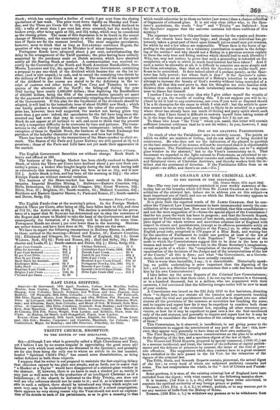TRINITY CHURCH, BROMPTON.
TO THE EDITOR OF THE SPECTATOR.
Brompton, 17th April 1843.
SIR—Although I am what is generally called a High Churchman and Tory, yet I believe I am by no means singular in appreciating the good sense and fairness with which most subjects are discussed in the Spectator, and probably am far also from being the only one to whom an article in its last number, headed " Spiritual Child's Play," has caused some dissatisfaction, as being rather deficient in both these respects. I suppose that its writer is not prepared to maintain the fast-expiring fallacy that churches cannot be too plain and simple, and so forth, nor to assert that "a Hooker or a Taylor" would have disapproved of a stained-glass window in the abstract. If, however, there is no harm in such a window per se, surely it may just as well seem to be the production of an intelligent Christian as of a kaleidoscope ; if the church be dedicated to the Holy Trinity. one does not well see why reference should not be made to it ; and if, as issalmost unavoid- able in such a subject, there should be introduced any thing which might not seem very easy to be understood by all the members of a mixed congregation, there appears no very strong reason why the Vicar should not send an explana- tion of its detaila to each of his parishioners, so as to give • meaning to that which would otherwise be to them no better (nor worse) than a chance collecboas of fragments of coloured glass. It is not very clear either why, in the Spes- tator's quotations, the words " four " and " Trinity" are italicized: dew the Spectator suppose that the universe contains but three emblems of this mystery?
The expenses incurred in this particular instance for the repairs and decora-
tion of the church have been very large ; and though one individual has .ge- nerously taken a great part of them upon himself, yet no small sum yet remains, for which he and a few others are responsible. Where then is the harm of ap- pealing to the parishioners for a voluntary contribution to assist in the defray- ing of the residue? and why should not a Bishop in a previous sermon explain to them the only true and fitting motives which should lead to such liberality ? Why, too, may not notices be given that such a proceeding is intended on the completion of a work in which so much local interest has been taken And if such a notice be allowable at all, it is difficult to conceive one more simple and free from ostentation, than that at which the Spectator, so unlike itself, pro- fe313ES to be astonished. It does indeed admit of a profane parody, as the Spec- tator has fully proved; but whose fault is that ? If the Spectator's corre- spondent cannot see an announcement of a Bishop's intention to assist in an attempt to increase the beauty of God's worship without being reminded of a playbill, all that this need prove is, that his thoughts are more familiar with theatres than churches ; and for such involuntary associations he may have none to blame but himself.
I confess I have no very clear idea why I give either myself the trouble of
writing or you the trouble of reading this. I do not suppose you will be in- clined to let it lead to any controversy, nor even if you were so disposed should I be a fit champion for the cause to which I wish well : but the article in ques- tion seemed to me so very unfounded, and so likely to do mischief in a quarter where there has already been too much ill-feeling and party-spirit about such matters, that I have found it difficult to restrain myself from taking notice of it, in the hope that some good may come, though how I do not see.
To those who know "the Vicar" whom you assail, this letter will contain sufficient internal evidences that he is not its writer ; to you, however, I may as well subscribe myself as
ONE OF HIS CRATEFUL PARISHIONERS.
[In much of what the Parishioner says we entirely concur. The points on which we differ are matters of feeling, and do mit admit of being decided by controversy. He who does not see the indecorum of the placard in question on the bare statement of its tcnour, will not be convinced that it is objectionable by arguments. The Parishioner overlooks the real objection, not to "a stained glass window in the abstract," but to the Vicar's commentary on it. That document we regarded in the light natural to Protestants, as calculated to en- courage the substitution of allegorical conceits and emblems, for broad, simple, and Scriptural views of Christian doctrines and thereby weaken both the in- tellect and the sentiment of devotion. If the Parishioner differs from US OR this point—we differ, and there's an end.—En.]


























 Previous page
Previous page